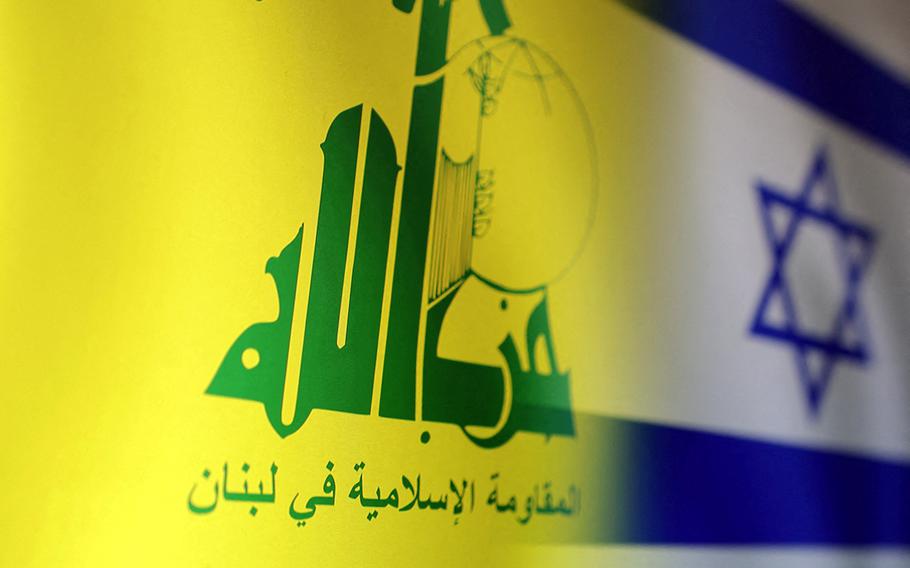
Hezbollah and Israel flags are seen in this illustration taken, October 15, 2023. (Dado Ruvic/Illustration/Reuters)
From the moment Hezbollah fighters started launching rockets and missiles into northern Israel a year ago, the Biden administration’s messaging has been consistent: the United States wants de-escalation along the Israeli-Lebanese border.
The best way to accomplish this objective, U.S. officials said, was through a diplomatic agreement that provides the hundreds of thousands of people displaced on both sides of the border with the confidence to return to their homes.
Yet after Israeli Prime Minister Benjamin Netanyahu escalated the conflict with Hezbollah last month, you don’t hear much in Washington about the necessity of a cease-fire anymore. Yes, Secretary of State Antony Blinken and Defense Secretary Lloyd Austin stress the urgency of avoiding excessive civilian casualties. But outside of generic talking points, U.S. policy has largely been suspended in time.
The Israelis have a game plan in Lebanon, intend to execute it and are perfectly fine with downplaying or outright ignoring whatever reservations the U.S. may have. In the meantime, the U.S., the world’s foremost superpower, looks increasingly feckless, unable or unwilling to constrain a junior partner now fighting two wars simultaneously.
Indeed, it’s amazing how quickly U.S. policy in Lebanon has changed over the span of a few weeks. There was a time not so long ago when President Joe Biden dispatched Amos Hochstein, one of his troubleshooters, to work with Israeli and Lebanese officials on averting a large-scale war that none of the parties seemed to want. Using Lebanese government officials as intermediators to Hezbollah, the U.S. pitched several proposals to the group in the hope common ground could be reached.
The goal was clear, but the time pressure was enormous; with every day that Israel and Hezbollah traded fire, the patience in Jerusalem for an agreement waned.
Netanyahu, who was already receiving pressure from the families of the remaining hostages in Gaza, also became a target of the roughly 60,000 Israelis in the north who hadn’t set foot in their houses for months. Even Israeli politicians considered more moderate, like opposition leader Benny Gantz, were calling on Netanyahu to be more aggressive on the Lebanon front.
The extremists in Netanyahu’s Cabinet, who view any diplomatic agreement with Hezbollah as Neville Chamberlain-style appeasement, were clamoring for war months earlier.
After months of reciting talking points, it started to dawn on everybody that getting to a cease-fire was all but impossible given the respective positions of the parties. Hezbollah was categorical that it wouldn’t stop launching drones and rockets into northern Israel until the war in Gaza stopped.
For Netanyahu, this was a nonstarter; withdrawing from Gaza would anger the hard-right ministers in his Cabinet and jeopardize the stability of his coalition government. As time wore on, and as the firing between Israel and Hezbollah became more intense, the Israelis got less and less impressed with Washington’s mediation efforts.
The dam broke in mid-September. Israel came to the conclusion that it could extract more from Hezbollah on the battleground than it could at the negotiating table.
On Sept. 17 and 18, thousands of pagers and hand-held radios used by Hezbollah officials and fighters exploded simultaneously, causing chaos throughout Lebanon in what can only be described as the most sophisticated Mossad operation in modern history.
On Sept. 27, Israel bombed Hezbollah’s headquarters in the dense Beirut suburbs, killing Hezbollah leader Hassan Nasrallah as well as an Iranian general. Days later, thousands of Israeli forces invaded southern Lebanon with the goal of destroying Hezbollah infrastructure along the border and wiping out as much of the group’s missile stockpile as possible.
Today, Lebanon is a country at war. More than 1 million Lebanese are internally displaced. Israel has ordered residents in dozens of villages, towns and cities in the south to evacuate north of the Awali River, which is roughly 30 miles from the border.
Beirut, a lively, cosmopolitan city that has seen its fair share of war over the last 40 years, is again a city under fire. Beirut’s southern suburbs are even worse off, with Israeli airstrikes hitting the area on a daily basis.
Two weeks after it began, the extent of Israel’s military campaign remains in flux; although the Israeli government claims it doesn’t want to occupy Lebanese territory like it did during the 1980s and 1990s, the widespread evacuation orders across a large segment of the country suggests this is precisely what Netanyahu may have in mind.
It’s all a bit ominous for the Americans as well. “We support their (Israel’s) ability to target militants, to degrade Hezbollah’s infrastructure, to degrade Hezbollah’s capability, but we are very cognizant of the many times in the past where Israel has gone in on what looked like limited operations and has stayed for months or for years,” the State Department’s chief spokesman said last week.
It’s quite clear what Israel wants: Hezbollah moves farther north, the border region is put in the hands of a military force the Israelis can trust, and Hezbollah itself loses the political strength it has acquired over the Lebanese state. We can debate whether those objectives are realistic or not, but Israel at least has a vision.
You can’t say the same about the United States. In Lebanon, Washington is essentially outsourcing its foreign policy to Israel. Once Israel escalated its air campaign in Lebanon and ordered a ground campaign, the same cease-fire U.S. officials were so invested in attaining over the last year evaporated virtually overnight. “We need a cease-fire” has turned into,“well, let’s see what Israel can do militarily before we get back to the table.”
The U.S. is making it up as it goes along and allowing Israel to dictate events. And Israel is more than happy to do so.
Daniel DePetris is a fellow at Defense Priorities and a foreign affairs columnist for the Chicago Tribune.